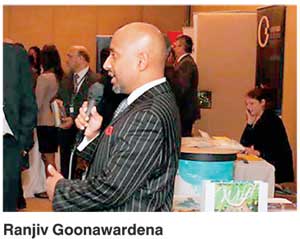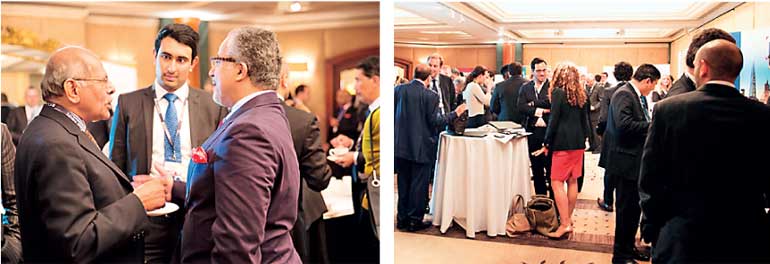Tuesday Feb 24, 2026
Tuesday Feb 24, 2026
Tuesday, 14 June 2016 00:15 - - {{hitsCtrl.values.hits}}
International Consultants Chairman and Vice Chairman of AAOE Ranjiv Goonawardena provided a golden opportunity by sponsoring the 10th Anniversary of the Sukuk Summit 2016 on 25-26 May at the Jumeirah Carlton Tower in Knightsbridge, London for Sri Lanka Tourism Promotion Bureau to participate as an exhibitor, to showcase Sri Lanka’s enormous potential and strengths in tourism.
Attending this event was an illustrious gathering of captains of industry from the Middle East and around the world, and the evening concluded with a Gala Dinner Awards to acknowledge some of the best financial institutions in the sector.
As Sri Lanka was celebrating 50 years in tourism recently, which coincided with the Sukuk Summit 2016 in London, it was a major achievement to have a noticeable presence at the conference for Sri Lanka, reported Goonawardena.
Prime Minister Ranil Wickremesinghe stated that tourism will be given new direction in a five-year plan currently being compiled by the Government of Sri Lanka, while insisting that the industry needs to do more to get the maximum out of Sri Lanka’s tourists.
The Prime Minister advocated that things have to change – and change fast. He outlined the Government’s proposals to boost the hospitality sector throughout the island nation and invited foreign investors to explore investing opportunities, while acknowledging that the Government lacked the necessary capital to go ahead with all the proposed schemes.
Sri Lanka now needs to find alternative sources of finance to drive the economy forward as challenging times are ahead with lack of liquidity in Europe, America and the sluggish economical progress in Southeast Asia. This is where the private sector could play a fundamental part in propelling Sri Lanka forward by looking at alternative sources of finance in developing infrastructure and sustainable development goals, clarified Goonawardena.
He also went on to highlight that Sukuk is an Islamic platform that is structured in such a way as to generate returns to investors without paying interest, so as to not infringe on Islamic law that prohibits interest. Sukuk represents undivided shares in the ownership of tangible assets. This is can be seen as a more ethical way of doing business without charging interest and it might be of great interest to borrowers around the globe – especially Sri Lanka.

Goonawardena went on to quote that the Rt. David Cameron Prime Minister in the UK, has tapped into this type of alternative funding, stated in a recent conversation that the UK – and London in particular – has already become a centre for Islamic finance. Most of the major International banking organisations provide some form of Islamic finance in the city of London. And Islamic finance has helped transform London’s skyline by financing in whole or in part developments such as The Shard, Chelsea Barracks, Harrods and the Olympic Village.
The global Sukuk market has maintained its sustainability and is poised to pass the $ 100 billion mark in 2016. While the past year has proven to be a testing time: given the fall in oil prices and low commodity prices, and the political situation in the Middle East, it seems to be bringing exciting new opportunities for important new entrants to the Sukuk market. Innovation, Infrastructure and Inclusiveness are the emerging buzz words in the Sukuk market.
International Consultants is a consultancy and brokering hybrid with a private equity and a corporate finance group, and focusing on emerging markets, with 75% of their work being international (mainly Pan-Africa, and Asia). They have an ability to introduce key players within governments, regulators and the private sector. There are three elements to the business. These include: researching for projects with investment potential; recruiting principal shareholders, syndicating finance to other financial institutions, and acting as advisors to corporations and governments to develop strategies and solutions.
The minimum project size would be £ 100 million. The majority of the consultant’s expertise is in Corporate Finance: mergers and acquisitions. They are able to advise on multifaceted topics such as, sustainable development, attracting, direct foreign investment, oil and gas, internet/e-commerce, telecommunication, legal, media, technology, utilities, financial and investments.
